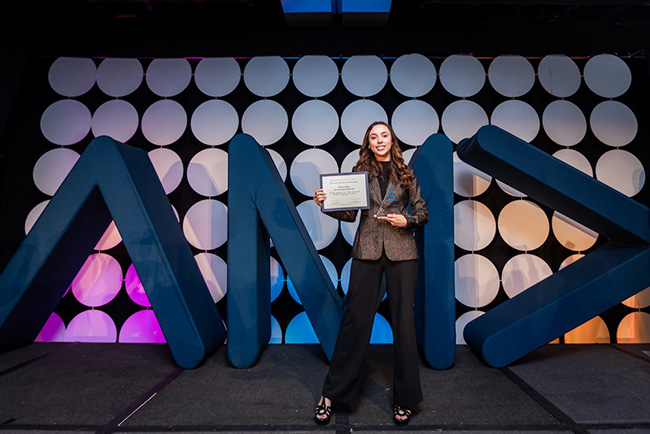
Will the Jobs of the Future be in Blockchain?
KENNESAW, Ga. | Mar 26, 2019
With Silicon Valley hailing blockchain as the next great technology revolution, Jim Nasr, an expert who has made a career out of studying it, recently told a group of Kennesaw State University business students to manage their expectations.
Nasr hosted a presentation entitled “The So-What of Blockchain” in March as part of the Michael J. Coles College of Business’s Learning Initiatives program. The program introduces faculty and students to emerging technologies and addresses their effects on the job market.

As Vice President of Technology and Innovation for Synchrogenix, which provides regulatory and communications consulting to the life sciences industry, Nasr has studied the practical applications of many technologies, including artificial intelligence, API interoperability, and blockchain.
During his presentation, Nasr described how blockchain technology, which is essentially a decentralized online ledger for managing data exchanges, is leading to improvements in areas like transaction processing and medical inventory management. However, he says that the media frenzy around bitcoin – a virtual currency and one of the most publicized uses of blockchain – has given the public an inaccurate understanding of the technology.
“Blockchain is not this magical thing where everything is going to be what’s called ‘on the chain,’” Nasr said. “It’s really like distributed accounting ledgers.”
When a transaction occurs on a blockchain network, it creates an unchangeable piece of data called a block, which populates throughout the network, or chain. The block is not stored on any one server, but instead in several pieces on the chain. Records in a blockchain are private and secure.
Although the media focuses on stories of people investing millions in cryptocurrencies like bitcoin, Nasr believes the exciting thing about blockchain is how it can enhance existing industries like healthcare.
He discussed a project he is working on called Open Pharma that uses blockchain to track the national supply of generic drugs. The Food and Drug Administration could potentially receive real-time updates of drug supplies at the pharmacy, distribution, and production levels, allowing them to respond quickly to any shortages.

Nasr concluded his presentation by advising business students to learn more about the real possibilities of using blockchain in other industries as they enter the workforce, adding that there is a real need for economists, game theorists, mathematicians, technology developers, and project managers.
“This stuff is the fodder for you guys to build amazing business on,” he said. “Continue to experiment, don’t get jaded, and find the right people to work with.”
Dr. Justin Cochran, Assistant Professor of Information Systems and chief organizer of the Learning Initiatives program, also urged business students not to overlook the effect new technologies like blockchain will have on their professional futures.
“You’ll find there is a lot beneath the surface that you should look at as you develop your career in business or otherwise,” he said. “It is coming for you in some form or fashion.”
– Patrick Harbin
Related Posts

Kennesaw State student wins marketing competition at international conference

Kennesaw State students, C-suite executives of Student Managed Investment Fund soon to begin finance careers

Kennesaw State's Healthcare Management and Informatics program celebrates 10 years preparing workforce leaders

Kennesaw State marketing students apply research skills to the real world by assisting nonprofits
















